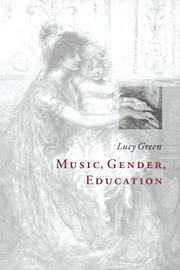Book contents
- Frontmatter
- Contents
- Acknowledgments
- 1 Introduction
- PART I MUSICAL MEANING AND WOMEN'S MUSICAL PRACTICE
- 2 Affirming femininity: women singing, women enabling
- 3 From affirmation to interruption: women playing instruments
- 4 Threatening femininity: women composing/improvising
- 5 Towards a model of gendered musical meaning and experience
- PART II GENDERED MUSICAL MEANING IN CONTEMPORARY EDUCATION
- Bibliography
- Index
5 - Towards a model of gendered musical meaning and experience
Published online by Cambridge University Press: 20 November 2009
- Frontmatter
- Contents
- Acknowledgments
- 1 Introduction
- PART I MUSICAL MEANING AND WOMEN'S MUSICAL PRACTICE
- 2 Affirming femininity: women singing, women enabling
- 3 From affirmation to interruption: women playing instruments
- 4 Threatening femininity: women composing/improvising
- 5 Towards a model of gendered musical meaning and experience
- PART II GENDERED MUSICAL MEANING IN CONTEMPORARY EDUCATION
- Bibliography
- Index
Summary
So far I have been discussing musical meaning in terms of the gender of the performer or composer. Another area in which meanings about gender and sexuality can be very clearly constructed is that of song lyrics and opera libretti. The verbally articulated meanings of lyrics and libretti are not part of the virtual intra-musical or inherent meaning of music; rather, words are conspicuous vehicles for conveying musical delineations. A growing number of writers have discussed the gender and/or the sexual implications of the verbal content of song lyrics and opera libretti, quite apart from any musical analysis. There are also several other approaches which are of a different nature in that they make very close connections between inherent meanings and the delineations of the words, sometimes coming near to dissolving the boundary between the two. A certain amount of work of this nature has been done with reference to popular song. Such work seeks to illuminate the mutual exchange between a song's verbally delineated meanings and their gestic or structural replication in inherent meanings. In the field of classical music, most (but not all) of this kind of attention has been paid to opera, which provides a provocative object of criticism where relations between the sexes and the construction of masculinity and femininity are explored overtly through the libretto, with relation to more covert significance in musical structures. Although their analytical and philosophical methods are all different, these approaches have in common the ability to expose the power of vocal music to express more than the words to which it is set, laying bare some of the traditionally unexamined assumptions that the music of the operatic canon is universal and innocent of political significance.
- Type
- Chapter
- Information
- Music, Gender, Education , pp. 116 - 140Publisher: Cambridge University PressPrint publication year: 1997



